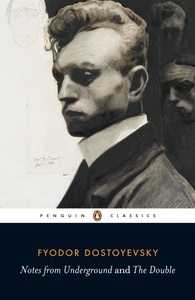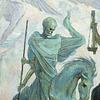You need to sign in or sign up before continuing.
Take a photo of a barcode or cover
5 stars for Notes from Underground, 3 for Double.
Notes from Underground... what could I say or not say about this novel(la).
Its literary standard is perhaps self-evident to those familiar with Dostoevsky. One could say there is nothing to say about this, in the sense that it is characteristic Dostoevsky.
Clearly not his masterwork, in view of its limited scope and range of ideas, Notes from Underground is a manifesto to the lost soul; or to put it in a more contemporary context of an intelligent individual ridden by paranoia, depression, and solitude.
The absurd moralising, the manic fits, all the little pieces delineate expertly, eloquently, and masterly the down-trodden, under siege mind of a person who is a victim of the incompatibility of their characteristics and those of their contemporary society.
The first part of the book is focused on the fictional author in isolation. Their traits, the intensity of their paranoia and solitude. The second part focuses on their interactions with other folk. And it is in the latter, that the fictional narrator is outside their comfort zone and ultimately stumbles upon realisations about themselves which, though aware of them, they had deeply concealed and fortified in their mind.
The piece can also be seen as sociopolitical criticism on any societal model that is founded on structured classes (covertly or openly). The moralising of the prostitute in the second part -- a morally ludicrous and misogynistic moralising, as it is admitted in the novel itself -- can also metamorphose into a critic of said societal model of inequality with the brothel standing for "the system", the prostitute for the worker, and the fictional narrator some caricature of a left-out, impecunious philosopher whose incapacity to bring about change is expressed through bombastic speeches whose actual value is degraded by their own flamboyance and pretentiousness. So to speak, I believe that there is a multitude of possible renderings of the themes that were discussed in this novel. Dostoevsky's works are heavily philosophical, which often has this (the parallels one may draw from the actual story) as a consequence.
A magnificent short piece, with very beautiful expression, and an honest look on a destructive aspect of the depression of an inert intellectual who is incongruent to their time.
Notes from Underground... what could I say or not say about this novel(la).
Its literary standard is perhaps self-evident to those familiar with Dostoevsky. One could say there is nothing to say about this, in the sense that it is characteristic Dostoevsky.
Clearly not his masterwork, in view of its limited scope and range of ideas, Notes from Underground is a manifesto to the lost soul; or to put it in a more contemporary context of an intelligent individual ridden by paranoia, depression, and solitude.
The absurd moralising, the manic fits, all the little pieces delineate expertly, eloquently, and masterly the down-trodden, under siege mind of a person who is a victim of the incompatibility of their characteristics and those of their contemporary society.
The first part of the book is focused on the fictional author in isolation. Their traits, the intensity of their paranoia and solitude. The second part focuses on their interactions with other folk. And it is in the latter, that the fictional narrator is outside their comfort zone and ultimately stumbles upon realisations about themselves which, though aware of them, they had deeply concealed and fortified in their mind.
The piece can also be seen as sociopolitical criticism on any societal model that is founded on structured classes (covertly or openly). The moralising of the prostitute in the second part -- a morally ludicrous and misogynistic moralising, as it is admitted in the novel itself -- can also metamorphose into a critic of said societal model of inequality with the brothel standing for "the system", the prostitute for the worker, and the fictional narrator some caricature of a left-out, impecunious philosopher whose incapacity to bring about change is expressed through bombastic speeches whose actual value is degraded by their own flamboyance and pretentiousness. So to speak, I believe that there is a multitude of possible renderings of the themes that were discussed in this novel. Dostoevsky's works are heavily philosophical, which often has this (the parallels one may draw from the actual story) as a consequence.
A magnificent short piece, with very beautiful expression, and an honest look on a destructive aspect of the depression of an inert intellectual who is incongruent to their time.
dark
mysterious
slow-paced
Plot or Character Driven:
Character
Strong character development:
No
Loveable characters:
Complicated
Diverse cast of characters:
No
Flaws of characters a main focus:
Yes
challenging
dark
emotional
mysterious
reflective
slow-paced
Plot or Character Driven:
Character
Strong character development:
No
Loveable characters:
Yes
Diverse cast of characters:
N/A
Flaws of characters a main focus:
Yes
challenging
dark
reflective
sad
slow-paced
Plot or Character Driven:
Character
Strong character development:
No
Loveable characters:
No
Diverse cast of characters:
No
Flaws of characters a main focus:
Yes
This review just pertains to Notes from the Underground in this volume.
I had such high hopes for this one. I purchased on recommendation from a booktuber who was highlighting classic you could read in a day. The ideas the recommender described appealed to me; I thought this could be a philosophical take reflecting back my own ennui and disenchantment with a life centered on status and work. I did not get what I was expecting here. The first section of Notes is a diatribe on what kind of man the narrator thinks himself to be, how he is both a thinker above everyone (but also not) and how other men in life are moved by action and attaining their own will. Yet his own self-reflections and doubts keep him from the action that would make him the more renowned sort of man. I hated this part, I understand Dostoyevsky is trying to pull the narrator back and forth, and in loops about his own predilections. He is meant to be…unreliable, but even more than that, unsure and weak in his opinions. But the writing here is dense and frustrates to the point that the message is lost and only annoyance was left for me.
The second sections improved very slightly for me, as it takes on a more narrative form, following Underground Man in his weird obsessions and attempts to gain self-respect. The most interesting part of this were his thoughts on the Russian sense of Romanticism being healthily mixed with the pragmatic. It felt…illustrative and sharp. I wish other sections felt as sharp as this segment. By the end of this, I just felt very bad for the prostitute and would have rather read something from her perspective. But I guess the conversations between the two were the most interesting part of the book and a neat little study in self-destruction. This isn’t really a review of the philosophy espoused in this text. I was too annoyed to get the the point of reflecting on all that.
I had such high hopes for this one. I purchased on recommendation from a booktuber who was highlighting classic you could read in a day. The ideas the recommender described appealed to me; I thought this could be a philosophical take reflecting back my own ennui and disenchantment with a life centered on status and work. I did not get what I was expecting here. The first section of Notes is a diatribe on what kind of man the narrator thinks himself to be, how he is both a thinker above everyone (but also not) and how other men in life are moved by action and attaining their own will. Yet his own self-reflections and doubts keep him from the action that would make him the more renowned sort of man. I hated this part, I understand Dostoyevsky is trying to pull the narrator back and forth, and in loops about his own predilections. He is meant to be…unreliable, but even more than that, unsure and weak in his opinions. But the writing here is dense and frustrates to the point that the message is lost and only annoyance was left for me.
The second sections improved very slightly for me, as it takes on a more narrative form, following Underground Man in his weird obsessions and attempts to gain self-respect. The most interesting part of this were his thoughts on the Russian sense of Romanticism being healthily mixed with the pragmatic. It felt…illustrative and sharp. I wish other sections felt as sharp as this segment. By the end of this, I just felt very bad for the prostitute and would have rather read something from her perspective. But I guess the conversations between the two were the most interesting part of the book and a neat little study in self-destruction. This isn’t really a review of the philosophy espoused in this text. I was too annoyed to get the the point of reflecting on all that.
Notes from the Underground is a fantastic book exploring the ideas of self-loathing and narcissism (seeming contradictory states) and how they can manifest into what we immediately want to call a repulsive person.
In the prologue to the book Dostoyevsky explores various aspects of the human condition such as autonomy and identity through the lens of a man who is designed to be repulsively narcissistic and self-loathing. By giving him such a detailed explanation of his rationale however, the character can't immediately be dismissed as some monster but forces us to examine how we resemble him in our own lives; we all have a bit of the Underground Man in us.
In the rest of the book Dostoyevsky tells a fanciful but psychologically rich story from the point of view of the Underground Man and how he approaches everyday life in increasingly repugnant and destructive ways, it's a page turner that you won't want to turn as each encounter becomes increasingly more cringe-inducing and dark. It's written so as to make it very difficult to sympathise with the Underground Man and yet we do so anyway because once again Dostoyevsky is genius in writing a despicable character that we can see in ourselves.
A bit like parables I have thought about instances in this book in my life and used them to help change perhaps more bitter instincts I may have, through showing you your potential worst he also shows you the way out of this loathing state of mind.
Couldn't recommend enough!
In the prologue to the book Dostoyevsky explores various aspects of the human condition such as autonomy and identity through the lens of a man who is designed to be repulsively narcissistic and self-loathing. By giving him such a detailed explanation of his rationale however, the character can't immediately be dismissed as some monster but forces us to examine how we resemble him in our own lives; we all have a bit of the Underground Man in us.
In the rest of the book Dostoyevsky tells a fanciful but psychologically rich story from the point of view of the Underground Man and how he approaches everyday life in increasingly repugnant and destructive ways, it's a page turner that you won't want to turn as each encounter becomes increasingly more cringe-inducing and dark. It's written so as to make it very difficult to sympathise with the Underground Man and yet we do so anyway because once again Dostoyevsky is genius in writing a despicable character that we can see in ourselves.
A bit like parables I have thought about instances in this book in my life and used them to help change perhaps more bitter instincts I may have, through showing you your potential worst he also shows you the way out of this loathing state of mind.
Couldn't recommend enough!
No avancé mucho, pero igual lo cuento como soft dnf para no perder las anotaciones que ya hice.
La verdad, siento que quizás este no es el mejor lugar por el qué empezar con Dostoievski. Leo una y otra vez y me cuesta entender qué coño me está diciendo 🤣 so, that's a me problem.
Lo retomaré más adelante.
La verdad, siento que quizás este no es el mejor lugar por el qué empezar con Dostoievski. Leo una y otra vez y me cuesta entender qué coño me está diciendo 🤣 so, that's a me problem.
Lo retomaré más adelante.
challenging
dark
mysterious
tense
medium-paced
Plot or Character Driven:
N/A
Strong character development:
No
Loveable characters:
No
Diverse cast of characters:
No
Flaws of characters a main focus:
Yes
I liked notes from the underground more than the double.
For some reason it took me a while to finish, and I didn’t really enjoy it as much as I thought.
For some reason it took me a while to finish, and I didn’t really enjoy it as much as I thought.
challenging
dark
emotional
reflective
sad
tense
dark
funny
mysterious
slow-paced
Plot or Character Driven:
Character
Strong character development:
Yes
Loveable characters:
No
Diverse cast of characters:
No
Flaws of characters a main focus:
Yes
i’m gna reread this at some point when i’m not in a brain fog but it was enjoyable









